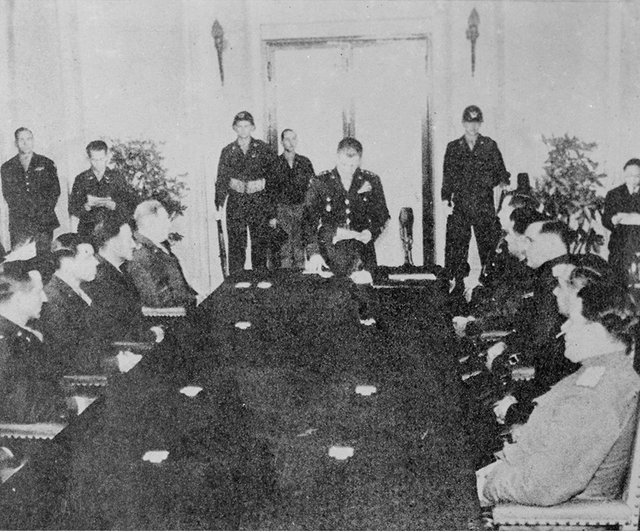(Korean War) Korean Division 1945 -1948, post #22
Prof. Kathryn Weathersby

By January 1947 American authorities in Korea faced a new dilemma. US tradition since the founding of the country was to avoid keeping a large standing army in peacetime, and American armed forces accordingly demobilized rapidly after the end of the world war. Now, however, given the expansive new responsibilities in Europe and Asia, there were not enough people or supplies to continue the occupation of southern Korea. It was costing $1 million per day, and the War Department informed President Truman that it simply could not continue its operations in Korea. Secretary of War Patterson insisted that the State Department ask Congress for more funds or accept that the US would have to withdraw from Korea.
At the same time, General MacArthur in Tokyo sent Washington new proposals for resolving the deadlock with the Soviets over Korea. He recommended that the US turn the issue over to the United Nations, which had, after all, been created for just such purposes. He suggested that an international commission be formed from countries not involved in the issue, which would devise a plan for how to fulfill the commitment the allies made in the 1943 Cairo Declaration that Korea would become independent after Japan was defeated. He also called for a four-power conference to clarify the Moscow agreement and a high-level Soviet-American conference to resolve the issues that were preventing the unification and independence of Korea. MacArthur warned that continued delay would be disastrous for the Korean people and for American prestige and influence in Asia.
War Department analysts judged MacArthur’s recommendations premature and also rejected the alternative of immediate independence for the southern zone in Korea. The State Department noted, reasonably, that MacArthur’s ideas were unrealistic since they required cooperation with the Soviets. Instead, State agreed with the Pentagon proposal that they request $50 million from Congress in order to continue the occupation.
At a meeting on January 29 of the State-War-Navy Coordinating Committee (SWNCC) Secretary Patterson described Korea as the “single most urgent problem now facing the War Department.” The administration agreed to request new appropriations from Congress in order to prevent economic and political collapse in the American zone. The SWNCC agreed to create a Special Inter-Departmental Committee to formulate a program for aid to Korea.
The situation was further complicated in early 1947 by attacks from Syngman Rhee on General Hodge accusing him of personal responsibility for the delay in Korea’s independence. In a letter to MacArthur Rhee urged the US to give up hope for cooperation with Moscow and instead hold separate elections for a provisional government in the southern zone. Conservatives in the Interim Legislative Assembly that had been established in the South the previous year passed a resolution denouncing trusteeship and rejecting any compromise with the Soviets on the principle of freedom of expression.
In the face of all these difficulties, a despairing General Hodge wrote to MacArthur that “Korea has developed into a real hot spot of the Orient, now ripe for a full-fledged civil war of unsurpassed savagery unless positive and cooperative international action is taken immediately. It is my carefully considered opinion that unless the Joint Commission should successfully reconvene or positive action be taken in the Korean situation on a national level within the next two months, we may lose the opportunity of accomplishing our avowed mission in Korea and will have lost the confidence of the Korean people.”
In the next post we will examine the recommendations the Special Interdepartmental Committee presented in February and the increasing sense of urgency among American officials in Washington and Seoul over the situation in Korea.
[Sources: This post relies on James Matray, The Reluctant Crusade: American Foreign Policy in Korea, 1941-1950 (University of Hawaii Press, 1985)]
To listen to the audio version of this article click on the play image.

Brought to you by @tts. If you find it useful please consider upvoting this reply.
a very remarkable work,tells the history of ancient times in korea,success is always my brother,@wisdomandjustice
excellent! And thank you for your support.
I am very interested in your story. the story of ancient korea. I like this.
Unpaid related discussions
Related discussions
Interesteem(@interesteem) is a service that recommends related discussions using DeepLearning.
Please writing a discussion with #interesteem tag.